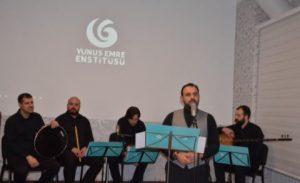In our final news round-up of the week, we take a look at the winner of the Ted Hughes Poetry Award and we also have an article about a meeting that took place in Austria about the poet Rumi.
Ted Hughes Poetry Award Won by Jay Bernard
 A London based poet, Jay Bernard, has beaten six other shortlisted entrants to win the Ted Hughes Award. The prize of £5000 was founded by Carol Ann Duffy – the Poet Laureate – and is funded by the poet laureate’s stipend which she receives from the queen.
A London based poet, Jay Bernard, has beaten six other shortlisted entrants to win the Ted Hughes Award. The prize of £5000 was founded by Carol Ann Duffy – the Poet Laureate – and is funded by the poet laureate’s stipend which she receives from the queen.
Surge: Side A, is a performance work that takes a look at the 1981 fire in south London in which 13 black youngsters died following a birthday party. Bernard performed the poem last year at the Roundhouse in London. The poem uses the pronoun “they” and took Bernard an hour to perform – it combined archive footage, with both film and audio, as well as live poetry that was written in the voices of the young people who were killed. Raw emotion plays a huge part in the poem, with Bernard switching between emotions and unfolding tragedy.
Thought to have been a racist arson attack the fire is considered to have been a defining and significant moment in Black British history. Inquests were held in 1981 and 2004, both of which returned open verdicts and no cause has ever been established for the fire although there has been much speculation.
The panel of judges who included the poets Gillian Allnutt and Lemm Sissay, felt that the poem showed a real honesty and vulnerability. Previous winners of the prize include Alice Oswald, who was the inaugural winner and Holly McNeish.
The winner of this year’s National Poetry Competition was also announced at the same awards ceremony. The winning entry from over 13,000 poems was “The Opened Field” by Dom Bury.
Rumi Meeting Organised in Austria
 The Yunus Emre Institute (YEE) of Turkey recently organized a conference in the Austrian capital Vienna to introduce the teachings of the Sufi mystic and Islamic scholar, Mevlana Jalaluddin al-Rumi.
The Yunus Emre Institute (YEE) of Turkey recently organized a conference in the Austrian capital Vienna to introduce the teachings of the Sufi mystic and Islamic scholar, Mevlana Jalaluddin al-Rumi.
The event was very well attended by both Turkish and Austrian delegates.
Rumi who is more commonly known to his followers in Turney as Meylana – a name which means scholar was a Muslim poet, Sufi mystic and philosopher who was born in present-day Afghanistan.
He is one of the most widely read philosophers in the world and despite the centuries that have passed since his death his teachings are still read by millions, transcending the boundaries of religion, race and colour.
Masnavi, an extensive poem, originally written by Rumi in Persian is considered to be one of the most influential works of Sufism, it has more than 50,000 verses and has been translated into 25 languages.


You must register to comment. Log in or Register.